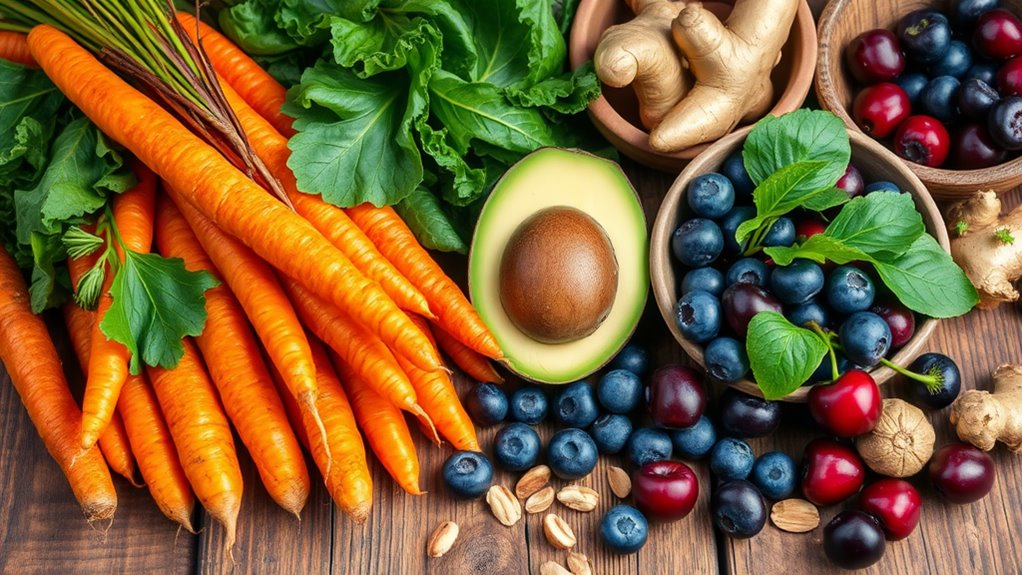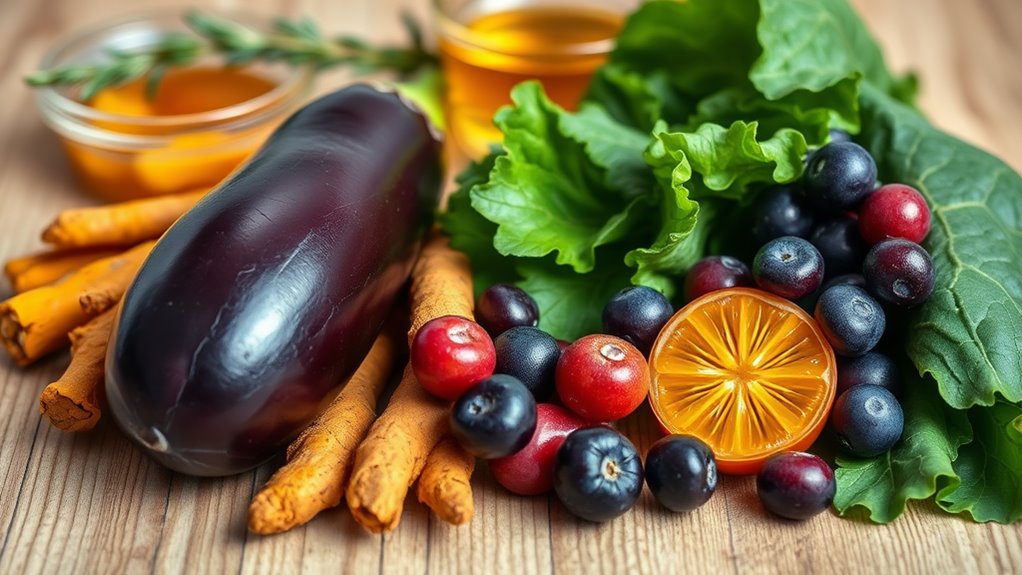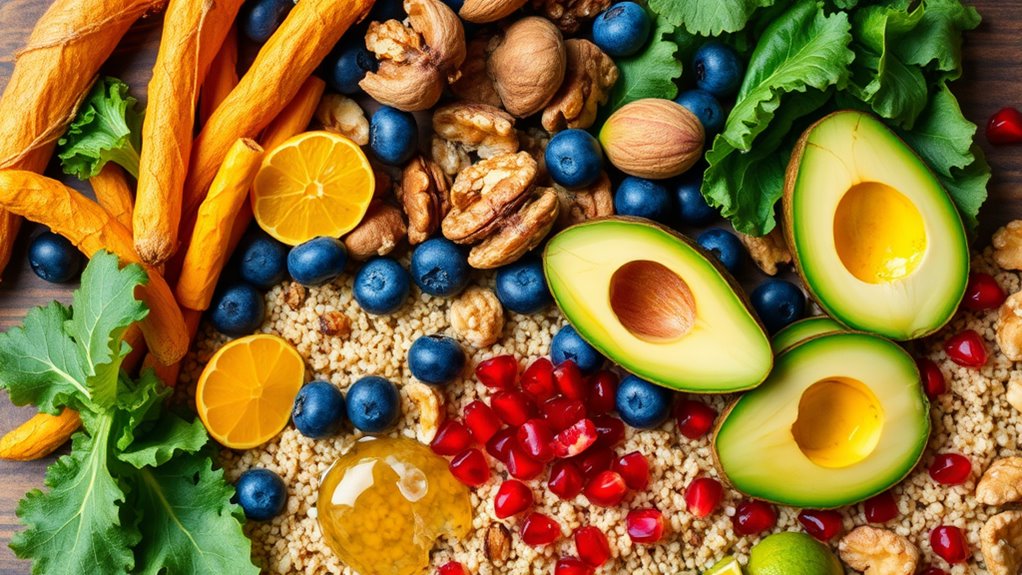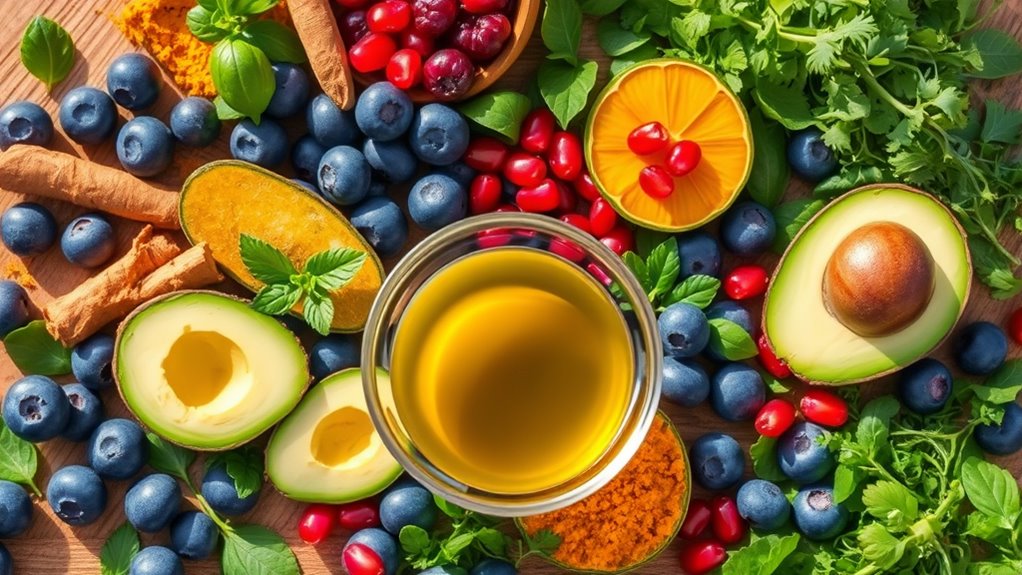7 Anti-Inflammatory Foods That Can Change Your Life!
Incorporating anti-inflammatory foods like turmeric, rich in curcumin, and antioxidant-packed berries can significantly boost your health. Fatty fish, loaded with omega-3s, supports heart health, while leafy greens provide essential nutrients to fight inflammation. Olive oil is a delicious way to reduce chronic disease risks. Don’t overlook the power of nuts, seeds, and ginger, as these small wonders pack a punch against inflammation. Keep going to discover how to easily add these superfoods to your diet!
Turmeric: The Golden Spice
When you think of spices that pack a nutritional punch, turmeric often comes to mind. This vibrant yellow spice, known for its active compound curcumin, boasts powerful anti-inflammatory properties. Incorporating turmeric into your meals can help reduce inflammation and support overall health. You can easily add it to soups, stews, or even smoothies for an extra boost.
Don’t forget to pair turmeric with black pepper; it enhances curcumin absorption significantly. You might also consider turmeric supplements for a concentrated dose.
Berries: Nature’s Antioxidant Powerhouses
Berries are among nature’s most potent sources of antioxidants, making them a fantastic addition to your diet. They combat inflammation and support overall health, giving you a delicious way to boost your well-being.
Here are three reasons to indulge in these vibrant fruits:
-
Rich in Nutrients: Berries are packed with vitamins, minerals, and fiber, promoting good digestion and immune function.
-
Anti-Inflammatory Properties: Their high levels of anthocyanins help reduce inflammation, lowering your risk of chronic diseases.
-
Versatile and Delicious: You can enjoy them fresh, in smoothies, or as toppings on yogurt and oatmeal, making it easy to incorporate into meals.
Fatty Fish: Omega-3 Rich Delights
Fatty fish, such as salmon, mackerel, and sardines, aren’t just delicious; they’re also packed with omega-3 fatty acids that play a crucial role in reducing inflammation and promoting heart health.
Incorporating these fish into your diet can significantly benefit your overall well-being. Omega-3s help lower levels of inflammatory markers in the body, which can improve conditions like arthritis and heart disease.
Aim for at least two servings of fatty fish each week to maximize these benefits. You can grill, bake, or even add them to salads for a tasty, healthful boost.
Leafy Greens: Nutrient-Dense Anti-Inflammatory Allies
After enjoying the benefits of fatty fish, you might want to turn your attention to leafy greens, which are also powerful allies in the fight against inflammation.
Packed with essential nutrients, these greens help reduce inflammation and promote overall health. Incorporating them into your diet can be simple and enjoyable.
Here are three leafy greens to consider:
-
Spinach: Rich in vitamins A, C, and K, spinach offers potent antioxidants that combat inflammation.
-
Kale: This nutrient powerhouse contains anti-inflammatory compounds and is high in fiber, supporting digestive health.
-
Swiss Chard: Loaded with magnesium and other minerals, Swiss chard helps regulate inflammation and promotes healthy muscle function.
Make these greens a staple in your meals for lasting health benefits!
Olive Oil: Liquid Gold for Health
While you explore various anti-inflammatory foods, don’t overlook the incredible benefits of olive oil, often dubbed “liquid gold.”
This heart-healthy fat is rich in monounsaturated fats and antioxidants, making it a powerhouse in reducing inflammation and promoting overall wellness. Incorporating olive oil into your diet can help lower your risk of chronic diseases, including heart disease and diabetes.
Use it as a dressing on salads, drizzle it over roasted vegetables, or incorporate it into your cooking. Its unique compounds, like oleocanthal, mimic the effects of anti-inflammatory medications, providing you with natural relief.
Nuts and Seeds: Small But Mighty
Nuts and seeds are tiny powerhouses packed with nutrients that can significantly reduce inflammation. Including them in your diet can lead to remarkable health benefits.
These small foods are rich in antioxidants, healthy fats, and fiber, making them an excellent addition to any meal or snack.
Here are three nuts and seeds to consider:
-
Walnuts: High in omega-3 fatty acids, they help combat inflammation and promote heart health.
-
Chia Seeds: Loaded with fiber and protein, they can stabilize blood sugar levels and keep you feeling full.
-
Almonds: Packed with vitamin E, they boost immunity and reduce oxidative stress.
Incorporating these into your daily routine could be a game-changer for your overall well-being!
Ginger: the Zesty Root With Healing Properties
Ginger is one of nature’s most potent anti-inflammatory foods, offering a wealth of healing properties packed into its zesty flavor. When you incorporate ginger into your diet, you’re not just adding a kick to your meals; you’re also helping to combat inflammation in your body.
Its active compound, gingerol, has powerful antioxidant effects, which can reduce oxidative stress and lower your risk of chronic diseases. You can enjoy ginger in various forms—fresh, powdered, or as a tea.
Try adding it to smoothies, stir-fries, or soups for a delicious twist. By including ginger regularly, you’ll not only enhance your dishes but also support your overall health and well-being.
Frequently Asked Questions
Can Anti-Inflammatory Foods Help With Chronic Pain Management?
Yes, anti-inflammatory foods can definitely help with chronic pain management. By incorporating these foods into your diet, you reduce inflammation, which may alleviate pain and improve your overall wellbeing. It’s worth giving it a try!
How Quickly Can I Expect to See Results From These Foods?
You might notice some improvements within a few days, but significant changes often take a couple of weeks. Consistency is key, so stick with it and pay attention to your body’s responses.
Are There Any Side Effects of Consuming Anti-Inflammatory Foods?
While most anti-inflammatory foods are safe, you might experience mild digestive issues or allergies. It’s essential to listen to your body and consult a healthcare professional if you notice any adverse reactions after incorporating new foods.
Can I Combine These Foods in Smoothies or Meals?
Absolutely, you can combine these foods in smoothies or meals! Mixing fruits, vegetables, and healthy fats enhances flavor and nutrition. Just ensure you’re balancing ingredients for optimal taste and health benefits. Enjoy experimenting!
How Do I Store These Foods for Maximum Freshness?
To store these foods for maximum freshness, keep them in airtight containers, refrigerate perishable items, and freeze anything you won’t use soon. Label everything with dates, so you know when to use them.





